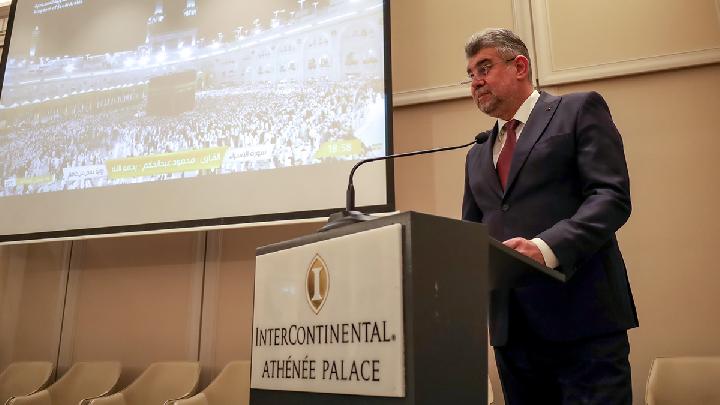TEMPO.CO, Jakarta - Indonesian President Prabowo's administration is currently formulating the 2025 Provincial Minimum Wage (UMP) to adjust to the Constitutional Court's Decision that annulled parts of the Omnibus Law on Job Creation, including regarding the determination of workers' wages.
If based on the Omnibus Law, the determination of UMP is based on Government Regulation (PP) No 51/2023 on wages with 3 variables namely inflation, economic growth, and a specific index ().
Minister of Manpower Yassierli stated that the formulation of UMP 2025 will be finalized in the near future by considering the balance between increasing workers' income and business competitiveness.
"Just wait, I have a target by the end of this month, and at the latest early next month," he said. This was after attending a limited meeting with President Prabowo Subianto at the Presidential Palace Complex, Jakarta, on Monday afternoon, November 25, 2024, as quoted by Antara.
Yassierli mentioned that there are many considerations to be taken into account in drafting the UMP formula, including regarding variables between increasing workers' income and business competitiveness.
In addition, Yassierli also ensured that the UMP 2025 formula would comply with the Constitutional Court's Decision (MK) regarding the Job Creation Law.
"As for complying with the MK decision, that's settled. We just need to formulate the most appropriate formula, based on input from labor unions, business associations, and various other parties that we are currently considering," he said.
According to Yassierli, President Prabowo provided guidance to find a middle ground between the interests of workers and employers, while considering the current economic conditions. "Finding that middle ground will also include taking into account our current situation, the economic condition, and everything else," he said.
In response to the labor union's rejection of the proposed UMP 2025 formula by the Ministry of Manpower, he said, "It's still in the drafting stage. What they are rejecting is not finalized yet."
Workers' Demands
Prior to this, the Indonesian Trade Union Confederation (KSPI) urged President Prabowo to establish the 2025 minimum wage policy in accordance with the Constitutional Court Decision Number: 168/PUU-XXI/2023.
The MK decision annulled several norms in the Omnibus Law on Job Creation related to wages, and mandated the setting of minimum wages based on inflation, economic growth, and a specific index (), without discrimination by the industrial sector.
Workers rejected the Minister of Manpower's draft regulation proposing different minimum wage categories for labor-intensive and capital-intensive sectors.
They also opposed the bipartite negotiation mechanism at the company level to determine the minimum wage, which was considered contrary to the MK decision.
Workers demanded that President Prabowo prioritize workers' welfare in the wage policy while maintaining national economic stability.
Employers' Suggestions
Minister of Manpower Yassierli revealed that they had accommodated suggestions from the Indonesian Employers Association (Apindo) regarding minimum wages in certain industries, including labor-intensive industries.
"They expressed concerns about some types of industries that are currently facing financial difficulties, requesting attention, and then it's normal to relate to economic conditions, investment absorption, and so on, which we will consider later," he said on Monday.
He explained that there is no decision yet concerning the proposal for minimum wages in labor-intensive industries submitted by Apindo. He acknowledged that in the meeting of over an hour, there has been no decision made yet and it is more dominated by considering suggestions.
Regarding the issue of dividing the two wage categories in the Ministry of Manpower's regulation on the determination of UMP 2025, he also denied this and referred to it as merely a discussion topic.
"No (division of two wage categories), that's initial discussions. The essence is that we want to protect companies experiencing financial difficulties, what the approach will be, it turns out it's not as simple as separating labor-intensive from capital-intensive," he said.
However, the focus or intention of this is that the Ministry of Manpower wants to increase workers' income while still considering business competitiveness.
Deputy Chairman of the Indonesian Employers Association (Apindo) in the Labor Sector, Bob Azam, stated that in the meeting with the Minister of Manpower, Apindo discussed issues of increasing productivity and wages.
Apindo also proposed some suggestions regarding labor-intensive industries to ensure that labor-intensive investors in Indonesia continue to grow.
"We're just saying that there needs to be considerations. So that labor-intensive industries can still invest in Indonesia," he said.
Observers: KHL, Inflation, and Economic Growth
Economist at UPN Veteran Jakarta, Achmad Nur Hidayat, stated that the Provincial Minimum Wage formula must include a Decent Living Needs (KHL), inflation, and economic growth (PE) as an urgent step to maintain workers' welfare and drive inclusive economic growth.
Setting a fair UMP is a central issue at the end of every year, where according to him, KHL is a crucial component in determining UMP.
"As a standard of the basic needs of single workers for a decent living during one month, KHL includes fundamental elements such as food, clothing, housing, education, health, and transportation," said Achmad to ANTARA in Jakarta on Monday.
However, relying solely on KHL without considering inflation, workers' purchasing power may erode, especially during price hikes of goods and services.
Moreover, he highlighted the importance of incorporating economic growth into the UMP formula. The economic growth variable reflects the overall performance of a country's economy.
"In terms of justice, workers as one of the pillars of the economy also have the right to enjoy the benefits of this growth. By incorporating economic growth into the UMP formula, we can create a fairer relationship between workers' contribution to the economy and the compensation they receive," he said.
Therefore, to create a fair UMP, Achmad suggested a formula based on three pillars, namely KHL, inflation, and economic growth.
KHL as the basis of workers' basic needs, inflation using annual data released by the BPS, including sectors that affect workers the most such as food and transportation, and economic growth (PE) as an incentive for workers to enjoy the results of their productivity.
He explained that the implementation of this formula would provide several benefits. First, improving workers' purchasing power by adjusting the UMP to inflation, workers can maintain their purchasing power even when prices increase.
Second, a fair UMP social stability can reduce labor conflicts. Third, strengthening domestic consumption, an equitable UMP can boost consumption, one of the main engines of national economic growth.
Editor's Choice: Prabowo Gathers Several Ministers at Palace to Discuss 2025 Minimum Wage
Click here to get the latest news updates from Tempo on Google News

 3 months ago
81
3 months ago
81













































